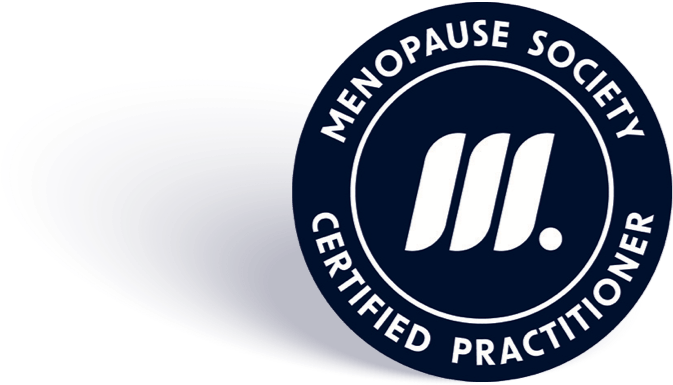Menopause Topics:
Premature Menopause
Premature Menopause occurs in about 3 in 100 women.

The normal age range of menopause is between 46 and 55 years However, about three in 100 women will go through menopause before age 40. This is known as premature menopause. There are several reasons why premature menopause occurs, and sometimes the exact reason is unknown. When it does occur, examination by a healthcare professional is recommended. Women who go through premature menopause may face emotional challenges and struggles with fertility. They also may have specific health risks that can be addressed with ongoing monitoring and treatment.
Induced Menopause
Induced menopause occurs when a medical treatment, such as surgery, chemotherapy, or radiation, removes or seriously damages both ovaries. The reason for the medical treatment may affect whether hormone therapy will be recommended.
- Surgery: When both ovaries are surgically removed, menopause results. Cancer is a common reason for this surgery. Removing both ovaries may be done to treat ovarian cancer or to help prevent breast and ovarian cancer in women who are considered to be at high risk.
- Chemotherapy: Chemotherapy is a powerful drug therapy to treat various types of cancer. It may be used along with surgery, radiation therapy, or both.
- Radiation therapy: Radiation therapy uses high-energy particles or waves to damage cancer cells and reduce their size or keep them from growing.
Primary Ovarian Insufficiency
Primary ovarian insufficiency (POI) is a condition in which younger women skip many periods in a row or have no periods at all. It occurs from a premature loss of ovarian follicles, resulting in lower levels of female reproductive hormones. A blood test may report a high follicle-stimulating hormone level, which can be a sign of menopause and of few eggs left in the ovaries. However, the release of an egg from an ovary (ovulation) may still occur on occasion, which means that pregnancy is still possible.
Some women with POI experience typical menopause symptoms, whereas others do not. If they do experience symptoms, they may be intermittent. Some women resume normal periods at some point, and others do not. There are several known causes of POI, including certain genetic and autoimmune disorders. Unfortunately, much is still unknown about this condition, which makes it difficult to predict what will happen. Women aged younger than 40 years who have missed three or more menstrual periods are advised to see a healthcare professional to determine whether this is caused by POI or whether another reason for absent or irregular menstruation is at play.
How Premature Menopause Affects Health
In general, the onset of menopause brings about an increase in certain risk factors, including those to the bone, the heart, and in brain health. For women who go through menopause early, these risks may be greater.
With menopause, there is usually a short time of more rapid bone density loss, which is followed by slower but ongoing bone loss. In the case of premature menopause, this earlier loss of bone may lead to an earlier risk of bone fractures related to osteoporosis. For women with premature menopause—in addition to taking estrogen to offset risk—it’s especially important to engage in activities that encourage the preservation of bone density.
Premature menopause also may increase the risk of heart disease later in life. In addition to taking estrogen to reduce heart risks, it’s important to follow a heart-healthy lifestyle. Particular steps include not smoking, reaching and maintaining a healthy weight, and being physically active on a regular basis. Certain dietary patterns, particularly those that promote adequate fruits, vegetables, and whole grains, also have been shown to have influence in heart health. Routine blood cholesterol testing and other tests, such as for diabetes, can help monitor specific risk factors, and medications may be recommended to optimize control.
Because menopause appears to influence cognitive function, this is an important consideration for women who experience menopause at a younger age. Estrogen has been shown to have protective effects on the brain. In addition, many of the same lifestyle habits used for heart health have been shown to be beneficial to memory and help protect the brain against dementia.
Just as important as the physical aspects of premature menopause are the emotional ones. Premature menopause can cause distress to a woman’s sense of self. For women who still want to have children, the effects may be particularly damaging. Premature menopause may increase concerns about body image, sexuality, fertility, and the perception of growing old prematurely. For women with POI, a diagnosis may be delayed, which can be frustrating. Women going through premature menopause also may need to cope with or continue treatment for the underlying condition that caused menopause to occur.
For women with induced menopause, especially when it results from treatment for a serious illness, a number of other fears and concerns may compound the challenges of premature menopause. These include
- Pain and discomfort related to the disease or treatment
- Anxiety over additional treatments
- A sense of loss of control related to illness, treatments, hospitalizations, and adverse events
- Confusion over lack of information or a feeling of information overload
- Frustration over a lack of support
- Reduced self-esteem because of changes from surgery
- Embarrassment related to hair or skin changes caused by chemotherapy or radiation
- Feelings of resentment or guilt
- Apprehension about relationships, including sexual activity and intimacy
- A feeling of uncertainty or hopelessness
- Fear of not being cured or of death
- Fear of the disease coming back (recurrence)
Frequently Asked Questions
If I have premature menopause, can I still have children?
Women with POI do sometimes ovulate, and pregnancy can occur naturally, which is why contraception is still recommended for those who do not desire pregnancy. However, the chance of a natural pregnancy is low, occurring in less than 10% of women with POI. For women with POI who desire children, there is increasing information and testing available about the number of remaining healthy eggs a woman has (her ovarian reserve) and how this relates to her chance of getting pregnant. A referral to a fertility specialist or a reproductive endocrinologist may be beneficial.
Can my menstrual periods return if they’ve stopped after having chemotherapy or radiation therapy?
It is possible that your periods may return after your ovaries have had time to recover after one of these therapies. However, the more time that passes without having a period, the less likely you are to have one again.
Videos & Podcasts
The Menopause Society is proud of its comprehensive video series for women and healthcare professionals on important midlife health topics.
View the entire video & podcast series
Premature and Early Menopause
Dr. Ekta Kapoor
Additional resources on this topic
Other menopause topics

Need help finding a certified menopause practitioner?
The Menopause Society’s website offers a searchable listing of healthcare professionals, including those who have earned the prestigious Menopause Society Certified Practitioner (MSCP) credential. Start your search for a certified menopause practitioner today.
Start your search for a certified menopause practitioner today.







